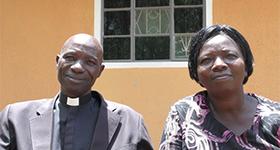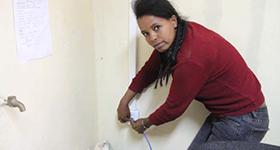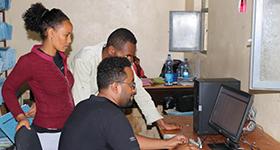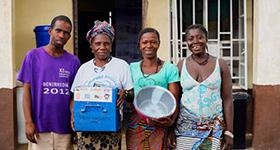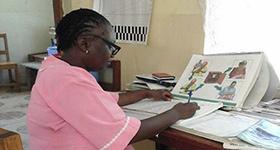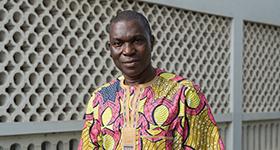Background
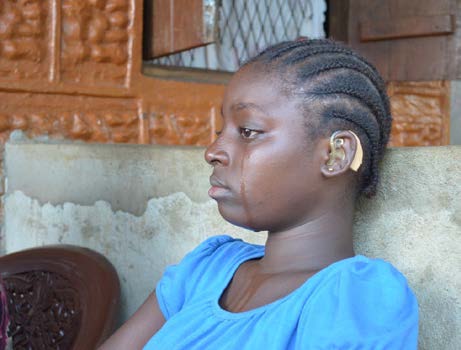
11-year-old Kadiatu Josiah lost her hearing after surviving Ebola in 2014. Photo: JSI/APC Sierra Leone
Kadiatu Josiah was nine when she lost her mother to Ebola in 2014. Kadiatu’s mother, who was a nurse, contracted the Ebola virus while treating an infected patient. She was among more than 200 health professionals who died while providing care to patients during the outbreak. She ended up spreading the virus to six other members in the family, including her husband. Only Kadiatu, her step-mother, and aunt survived.
The Ebola virus disease (EVD) outbreak devastated Sierra Leone’s already fragile health sector. Many of the more than 3,000 survivors were left with ongoing medical complications,including fatigue, neurological and joint pains, mental health issues, eye sight and hearing impairments, and fertility concerns—as well as having to face harsh economic situations related to loss of livelihoods, stigma, and discrimination.
When Kadiatu emerged from the Ebola Treatment Center alive, her step-mother and aunt celebrated her return. But quickly thereafter she experienced a temporary loss of vision. She was taken to the Sarolla Eye Clinic in Freetown for treatment, and Kadiatu slowly regained her sight. But soon after, however, she lost her hearing.
Intervention
The 11-year-old’s hearing loss was discovered by survivor advocate (SA) supervisor Osman Turay. Osman was trained by the Advancing Partners & Communities project’s local partner, GOAL, to identify EVD survivors and ensure that they receive treatment for any ongoing health issues.
Osman met with Kadiatu and worked with a referral coordinator (RC), also trained by the project, to ensure that she would receive appropriate treatment. Kadiatu got a referral to Connaught Hospital, the largest hospital in Sierra Leone, where doctors examined her and fitted her with a hearing aid.
But even with help from the Government and the project, living with the effects of Ebola is difficult. Kadiatu faces stigma in school because of her disability and the family must ensure they always have a supply of batteries for the hearing aid. “She is a bright and intelligent girl who used to hear clearly before she was infected,” says her stepmother, also named Kadiatu Josiah. “But now, she uses a hearing aid otherwise she hears nothing.”
Advancing Partners & Communities provides support to SAs, SA supervisors, and RCs who help Ebola survivors get the care they need. SAs and SA supervisors go into communities and provide health advice and assistance to survivors with medical conditions so they can get access to treatment under the Sierra Leone Government-sponsored Free Health Care Initiave (FHCI).
To help respond to the emerging health issues of EVD survivors like Kadiatu, JSI, through the USAID-funded Advancing Partners & Communities project, is supporting the Government’s Comprehensive Program for Ebola Survivors (CPES), jointly led by the Ministry of Health and Sanitation (MOHS) and the Ministry of Social Welfare, Gender and Children’s Affairs.
Outcomes
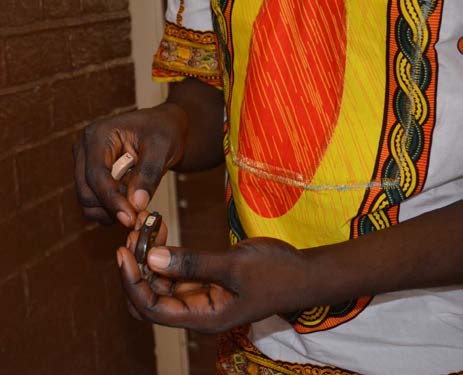
A hearing aid has enabled Kadiatu to stay in school. Photo: JSI/APC Sierra Leone
Through CPES, Kadiatu was identified and referred to a tertiary health facility that was able to provide the support she needed. Thanks to CPES and the project’s support, Kadiatu now has a hearing aid, which enables her to stay in school.
The Advancing Partners & Communities project works to prevent further EVD transmission and to improve access to quality health services for survivors by strengthening the health system’s ability to provide specialized services. As part of our support to the CPES program, the project has trained and mentored RCs, SAs, and SA supervisors, who are essential to linking EVD survivors with quality health services.
Through March 2018, the RCs supported 6,039 referrals for vulnerable population groups identified by the MOHS under the FHCI, which covers children under five, pregnant women, breastfeeding mothers, and EVD survivors.

